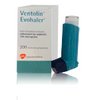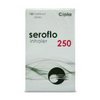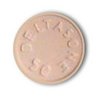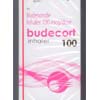 | Ventolin (Aurosal) Active Ingredient: Albuterol Ventolin is used for treating or preventing breathing problems in patients who have asthma or certain other airway diseases. Other names for this medication: Airet, Airomir, Apo-salvent, Assal, Asthalin, Aurosal, Avedox-fc, Broncovaleas, Ecutamol, Farbutamol, Novo-salmol, Salamol, Salbubronch, Salbutalan, Salbutamol, Salvent, Sultanol, Ventide, Ventodisk, Ventorlin, Volmax Show all |
| Package | Per Pill | Price | Savings | Bonus | Order |
|---|---|---|---|---|---|
| 100mcg × 1 inhalers | $37.71 | $37.71 | + Ed trial pack 1 | ||
| 100mcg × 3 inhalers | $26.91 | $80.73 | $32.4 | + Cialis | |
| 100mcg × 6 inhalers | $24.21 | $145.26 | $81 | + Viagra |
INDICATIONS
Ventolin is used for treating or preventing breathing problems in patients who have asthma or certain other airway diseases. It may be used to prevent breathing problems caused by exercise. Ventolin is a sympathomimetic (beta agonist) bronchodilator. It works by relaxing the smooth muscle in the airway, which allows air to flow in and out of the lungs more easily.
INSTRUCTIONS
Use Ventolin as directed by your doctor.
- Ventolin is for oral inhalation only. Do not spray in the eyes. If you get Ventolin in the eyes, rinse immediately with cool tap water.
- Prime the inhaler before the first use, any time it has not been used for more than 2 weeks, or if it has been dropped. To prime the inhaler, point it away from you and others. Spray 4 times, shaking well before each spray. If the inhaler has not been used for at least 4 days, re-prime by spraying 2 times.
- Before using Ventolin, be sure that the canister is properly placed in the inhaler unit. Shake well before each use. Remove the protective cap from the mouthpiece and check to make sure there are no hidden foreign objects. Breathe out slowly and completely. Place the mouthpiece between your lips and try to rest your tongue flat, unless your doctor has told you otherwise. Your doctor may have told you to hold the inhaler 1 or 2 inches (2 or 3 centimeters) away from the open mouth or to use a special spacing device. As you start to take a slow deep breath, press the canister and mouthpiece together at exactly the same time. This will release a dose of Ventolin. Continue breathing in slowly and deeply and hold for as long as comfortable (up to 10 seconds), then breathe out slowly through pursed lips or your nose. If more than 1 inhalation is to be used, wait 1 minute and repeat the above steps. Keep the spray away from your eyes.
- Ventolin may cause dry mouth or an unpleasant taste in your mouth. Rinsing your mouth with water after each dose may help relieve these effects.
- Clean the plastic mouthpiece and cap at least once a week to prevent blockage. Remove the metal canister. Rinse in warm running water for 30 seconds. Shake off excess water, and then allow the mouthpiece to air dry completely (eg, overnight). After the plastic case and cap dry, replace the canister. Spray 1 time into the air away from yourself and others. Place the cap back on the mouthpiece. Do NOT allow the metal canister to become wet.
- If you must use the inhaler before it is completely dry, shake the excess water off of the plastic mouthpiece. Shake the canister well, then insert into the plastic case and spray 1 time into the air away from yourself and others. You may then use a dose. After your dose, rewash the plastic case and air dry completely.
- If the inhaler becomes blocked, wash the plastic case as directed.
- This inhaler contains 200 sprays. Do not use this inhaler after 200 sprays have been used. It may not give the correct amount of medicine with each spray.
- Do not use Ventolin with any other mouthpiece. Do not use this mouthpiece with any other medicine.
- Do not stop using Ventolin without checking with your doctor.
- If you miss a dose of Ventolin and you are using it regularly, use it as soon as possible. If several hours have passed or if it is nearing time for the next dose, do not double the dose to catch up, unless advised by your health care provider. Do not use 2 doses at once.
Ask your health care provider any questions you may have about how to use Ventolin.
STORAGE
Store Ventolin upright between 59 and 77 degrees F (15 and 25 degrees C). Do not freeze. Contents are under pressure. Do not puncture. Do not use or store near heat or open flame. Do not expose the container to temperatures above 120 degrees F (48 degrees C). The container may burst. Store the inhaler with the mouthpiece down. Do not use after the expiration date on the container or box. Keep Ventolin out of the reach of children and away from pets.
MORE INFO:
Active Ingredient: Albuterol sulfate.
Do NOT use Ventolin if:
- you are allergic to any ingredient in Ventolin
- you are using another short-acting sympathomimetic bronchodilator (eg, metaproterenol)
Contact your doctor or health care provider right away if any of these apply to you.
Some medical conditions may interact with Ventolin. Tell your doctor or pharmacist if you have any medical conditions, especially if any of the following apply to you:
- if you are pregnant, planning to become pregnant, or are breast-feeding
- if you are taking any prescription or nonprescription medicine, herbal preparation, or dietary supplement
- if you have allergies to medicines, foods, or other substances
- if you have a history of heart problems, (eg, fast or irregular heartbeat, low blood output), blood vessel problems, high blood pressure, or low blood potassium levels
- if you have a history of seizures, diabetes, an overactive thyroid, kidney problems, or an adrenal gland tumor (pheochromocytoma)
- if you have ever had an unusual reaction to another sympathomimetic medicine (eg, pseudoephedrine)
- if you are taking a monoamine oxidase inhibitor (MAOI) (eg, phenelzine) or tricyclic antidepressant (eg, amitriptyline), or if you have taken either of these medicines within the last 14 days.
Some medicines may interact with Ventolin. Tell your health care provider if you are taking any other medicines, especially any of the following:
- Diuretics (eg, furosemide, hydrochlorothiazide) because the risk of low blood potassium levels may be increased
- Catechol-O-methyltransferase (COMT) inhibitors (eg, entacapone), MAOIs (eg, phenelzine), short-acting sympathomimetic bronchodilators (eg, metaproterenol), stimulants (eg, amphetamine), sympathomimetics (eg, pseudoephedrine), or tricyclic antidepressants (eg, amitriptyline) because they may increase the risk of Ventolin's side effects
- Beta-blockers (eg, propranolol) because they may decrease Ventolin's effectiveness
- Digoxin because its effectiveness may be decreased by Ventolin
This may not be a complete list of all interactions that may occur. Ask your health care provider if Ventolin may interact with other medicines that you take. Check with your health care provider before you start, stop, or change the dose of any medicine.
Important safety information:
- Ventolin may cause dizziness. These effects may be worse if you take it with alcohol or certain medicines. Use Ventolin with caution. Do not drive or perform other possible unsafe tasks until you know how you react to it.
- Ventolin may sometimes cause severe breathing problems right after you use a dose. When this problem occurs, it is often after the first use of a new canister or vial. If this happens, seek medical care at once.
- If your usual dose does not work well, your symptoms become worse, or you need to use it more often than normal, contact your doctor at once. This may be a sign of seriously worsening asthma. Your doctor may need to change your dose or medicine.
- Ventolin should work for up to 6 hours. Do NOT use more than the recommended dose or use more often than prescribed without checking with your doctor. The risk of severe heart problems and sometimes death may be increased with overuse of Ventolin.
- Some patients may have trouble using Ventolin correctly. Some may also get mouth sores or a bad taste in the mouth after using it. If you have any of these problems, ask your health care provider if a spacing device may help.
- Tell your doctor or dentist that you take Ventolin before you receive any medical or dental care, emergency care, or surgery.
- Talk with your doctor or pharmacist about all of your asthma medicines and how to use them. Do not start, stop, or change the dose of any asthma medicine unless your doctor tells you to.
- Keep track of how many inhalations you use. When your medicine supply begins to run low, call your doctor or pharmacy as soon as possible for a refill.
- Do NOT place the canister in water to try to determine how much medicine you have left.
- The contents of this canister are under pressure. Do NOT puncture, break, or burn container, even if it appears empty.
- Diabetes patients - Ventolin may affect your blood sugar. Check blood sugar levels closely. Ask your doctor before you change the dose of your diabetes medicine.
- Use Ventolin with caution in the elderly; they may be more sensitive to its effects.
- Caution is advised when using Ventolin in children; they may be more sensitive to its effects.
- Pregnancy and breast-feeding: If you become pregnant, contact your doctor. You will need to discuss the benefits and risks of using Ventolin while you are pregnant. It is not known if Ventolin is found in breast milk. If you are or will be breast-feeding while you use Ventolin, check with your doctor. Discuss any possible risks to your baby.
All medicines may cause side effects, but many people have no, or minor, side effects.
Check with your doctor if any of these most common side effects persist or become bothersome:
Cough; headache; nausea; nervousness; sinus inflammation; sore or dry throat; tremor; trouble sleeping; unusual taste in mouth; vomiting.
Seek medical attention right away if any of these severe side effects occur:
Severe allergic reactions (rash; hives; itching; difficulty breathing; tightness in the chest; swelling of the mouth, face, lips, or tongue); chest pain; fast or irregular heartbeat; new or worsened trouble breathing; pounding in the chest; severe headache or dizziness; unusual hoarseness; wheezing.
This is not a complete list of all side effects that may occur. If you have questions about side effects, contact your health care provider.
 PrednisolonePrednisolone is used for treating allergies, arthritis, breathing problems (eg, asthma), certain blood disorders, collagen diseases (eg, lupus), certain eye diseases (eg, keratitis), cancer (eg, leukemia), endocrine problems (eg, adrenocortical insufficiency), intestinal problems (eg, ulcerative colitis), swelling due to certain conditions, or skin conditions (eg, psoriasis).as low as $0.36
PrednisolonePrednisolone is used for treating allergies, arthritis, breathing problems (eg, asthma), certain blood disorders, collagen diseases (eg, lupus), certain eye diseases (eg, keratitis), cancer (eg, leukemia), endocrine problems (eg, adrenocortical insufficiency), intestinal problems (eg, ulcerative colitis), swelling due to certain conditions, or skin conditions (eg, psoriasis).as low as $0.36 PromethazinePromethazine is used for relieving allergy symptoms, including hives or runny nose.as low as $0.7
PromethazinePromethazine is used for relieving allergy symptoms, including hives or runny nose.as low as $0.7 DecadronDecadron is used as an anti-inflammatory medication. Decadron relieves inflammation in various parts of the body. It is used specifically to decrease swelling (edema), associated with tumors of the spine and brain, and to treat eye inflammation. as low as $0.38
DecadronDecadron is used as an anti-inflammatory medication. Decadron relieves inflammation in various parts of the body. It is used specifically to decrease swelling (edema), associated with tumors of the spine and brain, and to treat eye inflammation. as low as $0.38 SerofloSeroflo Inhaler (Fluticasone/Salmeterol) is used for long-term prevention and treatment of asthma and chronic lung diseases.as low as $88.87
SerofloSeroflo Inhaler (Fluticasone/Salmeterol) is used for long-term prevention and treatment of asthma and chronic lung diseases.as low as $88.87 DeltasoneDeltasone is used to treat many different conditions such as allergic disorders, skin conditions, ulcerative colitis, arthritis, lupus, psoriasis, or breathing disorders.as low as $0.32
DeltasoneDeltasone is used to treat many different conditions such as allergic disorders, skin conditions, ulcerative colitis, arthritis, lupus, psoriasis, or breathing disorders.as low as $0.32 RhinocortRhinocort is used to control and prevent symptoms (wheezing and shortness of breath) caused by asthma.as low as $35.62
RhinocortRhinocort is used to control and prevent symptoms (wheezing and shortness of breath) caused by asthma.as low as $35.62